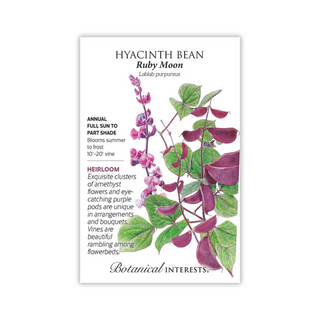
Description
Grown by Thomas Jefferson at Monticello, hyacinth bean is a dazzling ornamental with stunning, pinkish-purple flowers and shiny, dark purple pods that stand out against the purple and green foliage. Twining stems quickly climb a fence or trellis, trail across the ground for an attractive ground cover, or spill over container edges. Contains toxins; not recommended for eating. See inside for more information.
Variety Info
- Family: Fabaceae
- Native: Africa
- Hardiness: Perennial in USDA zones 10 and warmer, usually grown as an annual
- Exposure: Full sun to part shade
- Bloom Period: Summer to frost
- Plant Dimensions: 10'–20 vine
- Variety Info: Loose clusters of 1" purple sweet-pea-shaped flowers followed by attractive, shiny, 3"–5" long purple pods.
- Attributes: Drought Tolerant, Good for Containers
Sowing Info
- When to Sow Outside: RECOMMENDED. 1 to 2 weeks after your average last frost date, and when soil temperature is at least 65°F, ideally 70°–85°F. Successive Sowings: Every 7 to 14 days up to 80 days before your average first fall frost date. NOTE: In very hot summer areas, skip sowing as high heat approaches; temperatures consistently above 90°F will prevent beans from forming.
- When to Start Inside: Not recommended. 6 to 8 weeks before your average last frost date. Roots are sensitive to disturbance; use biodegradable pots that can be placed directly into the ground.
- Days to Emerge: 3–30 days
- Seed Depth: 1"
- Seed Spacing: A group of 2 seeds every 12"
- Thinning: When 2" tall, thin to 1 every 12"
Description
Grown by Thomas Jefferson at Monticello, hyacinth bean is a dazzling ornamental with stunning, pinkish-purple flowers and shiny, dark purple pods that stand out against the purple and green foliage. Twining stems quickly climb a fence or trellis, trail across the ground for an attractive ground cover, or spill over container edges. Contains toxins; not recommended for eating. See inside for more information.
Variety Info
- Family: Fabaceae
- Native: Africa
- Hardiness: Perennial in USDA zones 10 and warmer, usually grown as an annual
- Exposure: Full sun to part shade
- Bloom Period: Summer to frost
- Plant Dimensions: 10'–20 vine
- Variety Info: Loose clusters of 1" purple sweet-pea-shaped flowers followed by attractive, shiny, 3"–5" long purple pods.
- Attributes: Drought Tolerant, Good for Containers
Sowing Info
- When to Sow Outside: RECOMMENDED. 1 to 2 weeks after your average last frost date, and when soil temperature is at least 65°F, ideally 70°–85°F. Successive Sowings: Every 7 to 14 days up to 80 days before your average first fall frost date. NOTE: In very hot summer areas, skip sowing as high heat approaches; temperatures consistently above 90°F will prevent beans from forming.
- When to Start Inside: Not recommended. 6 to 8 weeks before your average last frost date. Roots are sensitive to disturbance; use biodegradable pots that can be placed directly into the ground.
- Days to Emerge: 3–30 days
- Seed Depth: 1"
- Seed Spacing: A group of 2 seeds every 12"
- Thinning: When 2" tall, thin to 1 every 12"

